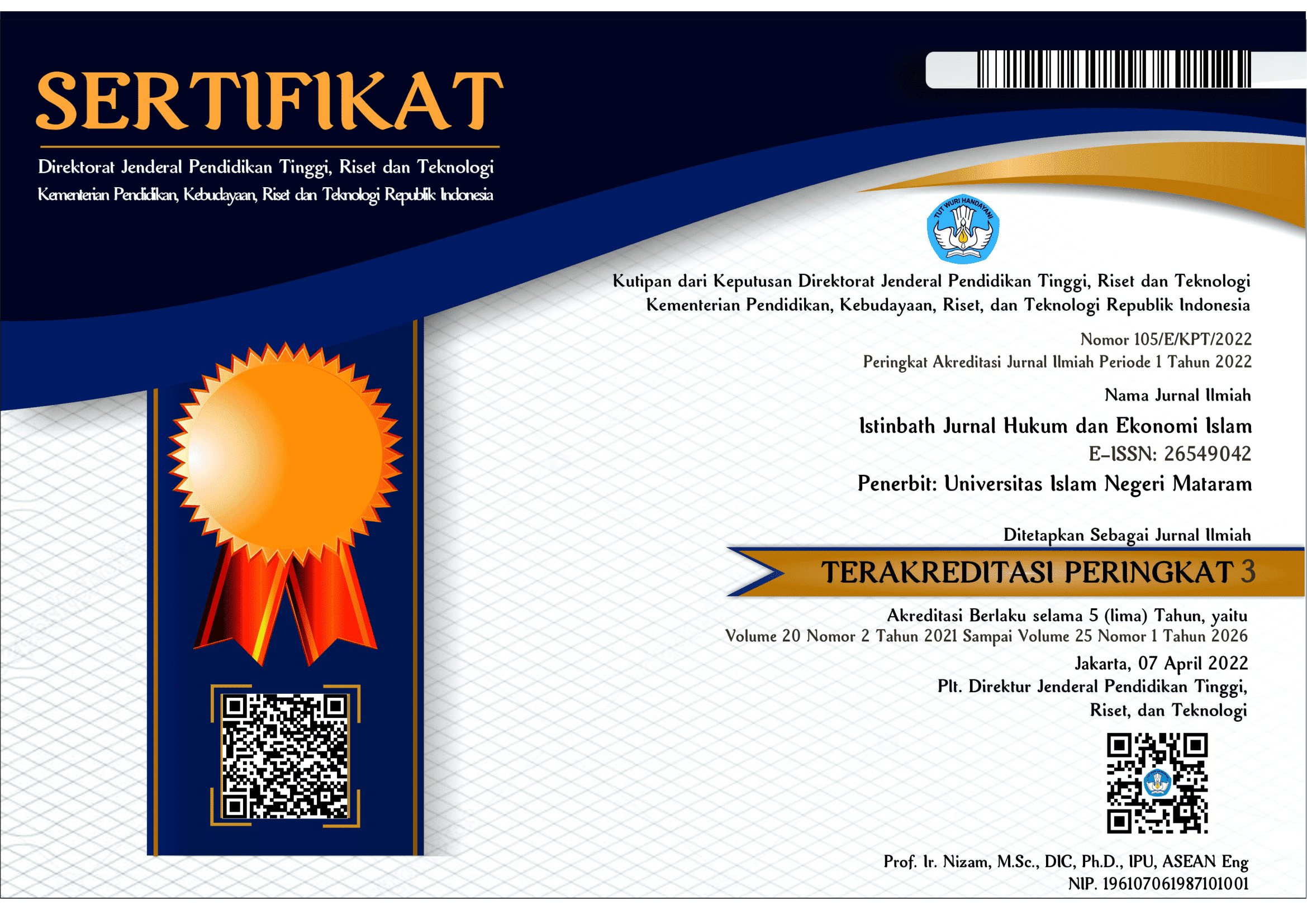RELEVANCE OF VERSES ON POLITICS IN THE QURAN WITH THE CONSTITUTION IN INDONESIA; THEMATIC PANCASILA, UUD I945, AND CONTROVERSIAL ARTICLES IN CRIMINAL CODE (KUHP)
Tematik Pancasila, UUD 1945 dan Pasal-Pasal Kontroversial KUHP
DOI:
https://doi.org/10.20414/ijhi.v22i2.549Keywords:
Al-Qur'an, Politics, Indonesian ConstitutionAbstract
The Qur'an has become a universal guide to life - including political ethics - although it is not explained explicitly so that in its development, the concept of politics and government reflected in the constitution often has relevance to the values of the Qur'an. This study aims to reflect on the main values in the al-Qu'an related to political ethics to be elaborated in the concept of the Constitution in Indonesia, namely Pancasila and the UUD 1945. This research analyses the result using a qualitative approach, a thematic literature study method aided by Abdullah Saeed's contextual hermeneutic approach. The research results show that as a whole, the Pancasila precepts have a meaning that is relevant to the values of the Qur'an, namely the 1st precept of monotheism, the 2nd precept of equality, the 3rd precept of brotherhood/ unity, the 4th precept of deliberation in the process of decision-making, and the 5th precept of social justice/welfare. As for the thematic review of the UUD 1945, there are basic values of political ethics in the Qur'an, namely regarding law, power, and sovereignty; leadership and democracy; government apparatus; and Human Rights. Regarding the controversial articles in the Criminal Code, there are several important points, including the limitations on freedom of expression, alternative criminal penalties and commutation of sentences for corruptors, as well as punishment for adultery perpetrators, which in the contextualization of the values of the Quran contains the relevance of ethical, political and moral values.
References
Almuzammil, M. R., & Ridwan, M. (2023). Hak Asasi Manusia dalam Pandangan Al Qur’an. Jurnal Riset Indragiri, 2(2), 82–91.
Badan Pembinaan Hukum Nasional Kementerian Hukum dan HAM. (2022). Draft RUU KUHP Final. Retrieved December 16, 2022, from https://bphn.go.id/data/documents/draft_ruu_kuhp_final.pdf
Banjarani, D. R., Putri, T. Y., & Zulaikha, A. N. (2023). Insult in National Criminal Law and Islamic Criminal Law: Sanctions Perspective and Legal Developments Review. Ius Poenale, 4(1), 1–12. https://doi.org/10.25041/ip.v4i1.2867
Black, A. (2006). Pemikiran Politik Islam dari Masa Nabi Hingga Kini (A. Abdullah & M. Ariestiawati, Trans.). Jakarta: PT Serambi Ilmu Semesta.
CNN Indonesia. (2022a). Daftar Pasal Konrroversial RKUHP Terbaru. Retrieved December 16, 2022, from https://www.cnnindonesia.com/nasional/20221205202331-12-883194/daftar-pasal-kontroversial-di-rkuhp-terbaru
CNN Indonesia. (2022b). Mahfud: Seruan Moral KUHP Jangan Berzina. Retrieved December 16, 2022, from https://www.cnnindonesia.com/nasional/20221215152456-12-887869/mahfud-seruan-moral-kuhp-jangan-berzina
CNN Indonesia. (2022c). Pasal Zina KUHP: Satpol PP Tak Bisa Gerebek Bermodal Perda. Retrieved December 16, 2022, from https://www.cnnindonesia.com/nasional/20221214205806-12-887545/pasal-zina-kuhp-satpol-pp-tak-bisa-gerebek-bermodal-perda
Fadhil, A., & Sahrani. (2014). KEBEBASAN BERPENDAPAT DALAM AL–QUR’AN. Jurnal al-Fath, 08(02), 275–316.
Fatikhin, R. (2017). KEADILAN SOSIAL DALAM PERSPEKTIF AL-QUR’AN DAN PANCASILA. Penangkaran: Jurnal Penelitian Agama dan Masyarakat, 1(2), 293–313.
Hafizah, R., & Bustamam, R. (2021). Pemahaman Imam Al-Qurthubi Terhadap Konsep Riddah dalam Al-Qur’an dan Relevansinya dengan Indonesia. Istinarah: Riset Keagamaan, Sosial dan Budaya, 3(1), 1. https://doi.org/10.31958/istinarah.v3i1.3322
Hasibuan, A. R. G., Lubis, R., & Khoir, A. (2019). THE CONCEPT OF UNIVERSAL HUMANITY OF PANCASILA BASED ON AL-QUR'AN. International Journal of Humanities, Philosophy, and Language, 2(6), 179–186.
Hosaini, & Mohammad Ihyani, F. (2021). PANCASILA SEBAGAI WUJUD ISLAM RAHMATAN LI AL-ALAMIIN. MODERATION: Journal of Islamic Studies Review, 1(1), 91–98.
Junaedi, A. M., & Rohmah, S. N. (2020). Relevansi Hak Kebebasan Mengeluarkan Pendapat Dalam Pasal 28E Ayat 3 Undang Undang Dasar 1945 Negara Republik Indonesia Terhadap Kajian Fiqih Siyasah. Mizan: Journal of Islamic Law, 4(2). https://doi.org/10.32507/mizan.v4i2.816
Kemenkumham RI. (2022, June 12). RUU KUHP Disahkan menjadi Undang-Undang. Retrieved December 16, 2022, from https://ham.go.id/2022/12/06/35292/
Lajnah Pentashihan Mushaf Al Qur’an, K. A. R. (2022). Al Quran Kemenag. Retrieved June 29, 2023, from https://quran.kemenag.go.id/surah/42
Majelis Permusyawaratan Rakyat Sekretariat Jenderal. (2022). Undang-Undang Dasar Negara Republik Indonesia Tahun 1945 dalam Satu Naskah. Retrieved December 16, 2022, from https://jdih.mahkamahagung.go.id/legal-product/uud-1945-dalam-satu-naskah/detail
Makmur, M. (2019). Pandangan Al-Quran Dalam Politik. Manhaj: Jurnal Penelitian dan Pengabdian Masyarakat, 4(1), 51. https://doi.org/10.29300/mjppm.v4i1.2374
Marwandianto, M., & Nasution, H. A. (2020). Hak Atas Kebebasan Berpendapat dan Berekspresi dalam Koridor Penerapan Pasal 310 dan 311 KUHP. Jurnal HAM, 11(1), 1. https://doi.org/10.30641/ham.2020.11.1-25
Musolin, M. (2020). Nilai Maqashid al-Syari’ah Dalam Pancasila Sebagai Dasar Negara Kesatuan Republik Indonesia. Dialog, 43(1). https://doi.org/10.18202/jamal.2015.08.6021
Muthalib, S. A. (2019). Siyasah Dusturiyyah sebagai Sistem Perpolitikan dalam Al-Qur’an. Tafse: Journal of Qur'anic Studies, 4(2).
Muzakir, K. (2022). Zina Dalam Perspektif Hukum Islam dan Kitab Undang Undang Hukum Pidana. Formosa Journal of Science and Technology (FJST), 1(1), 33–46.
Nurhadi. (2020). Tematik Ayat-Ayat Pendidikan Politik Dalam Al Qur’an. Edisi: Jurnal Edukasi Dan Sains, 2(1), 41–60.
Pratama, M. R. (2022). PERLUASAN MAKNA ZINA DALAM PASAL 417 RANCANGAN KUHP INDONESIA. Jurnal Res Justitia: Jurnal Ilmu Hukum, 2(2), 254–268.
Putri, F. E., Asbari, M., Radita, F. R., Novitasari, D., & Purwanto, A. (2022). Diskursus Agama dan Pancasila: Meneguhkan Pancasila dalam Kebhinnekaan Indonesia. JPT: Jurnal Pendidikan Transformatif, 1(1).
Rohman, A. (2021). Bagaimana Konsep Pemilihan Pemimpin dalam Perspektif Konstitusi Indonesia dan Islam. Jurnal At-Tadbir: Media Hukum dan Pendidikan, 31(2).
Saeed, A. (2006). Interpreting the Qur'an: Towards a Contemporary Approach. UK: Taylor and Francis.
Saeed, A. (2008). The Qur'an: An Introduction. London dan New York: Taylor and Francis.
Saeed, A. (2019). Reading the Qur'an Contextually: Approach and Challenge. New Trends in Qur'anic Studies: Text, Context, and Interpretation, 2.
Shodiq, M. (2021). Quranic Moral in Pancasila: Efforts to Strengthen Mental Revolution Through the First Principle of Pancasila. Buletin Al-Turas, 27(1), 139–158. https://doi.org/10.15408/bat.v27i1.18209
Sutiono, S. (2022). Sebuah Tinjauan Hak Asasi Manusia Berdasarkan Hukum Islam Dalam Konstitusi Indonesia. Synotic Law: Jurnal Ilmu Hukum, 1(1), 57–70. https://doi.org/10.56110/sl.v1i1.5
Downloads
Published
How to Cite
Issue
Section
License
Copyright (c) 2023 Ashari Mujamil, Ali Wafa

This work is licensed under a Creative Commons Attribution-ShareAlike 4.0 International License.





